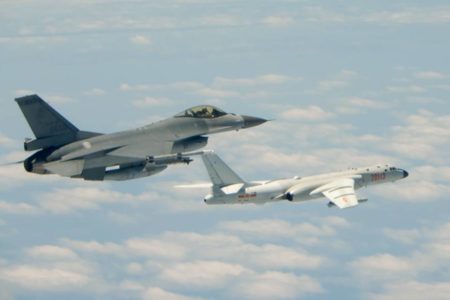
A Republic of China Air Force F-16 fighter jet flies alongside a Chinese People’s Liberation Army Air Force (PLAAF) H-6K bomber that reportedly flew over the Bashi Channel, south of Taiwan, and over the Miyako Strait, near Okinawa, in this photo released Friday by Taiwan’s Defence Ministry. | AFP-JIJI
Military developments
On May 13, China’s first domestically built aircraft carrier started his way from a dock of Dalian Shipyard, northeast China’s Liaoning province, for sea trials, the Chinese state-run news agency Xinhua reported.
According to the official sources quoted by Xinhua :
“The sea trials will mainly test the reliability and stability of the carrier’s power system and other equipment.”
The construction of the carrier was launched in April 2017. Then the “equipment debugging, outfitting and mooring tests have been completed” to make it ready for the sea trials. The name of the aircraft carrier hasn’t been announced yet.
On May 11, the People’s Liberation Army (PLA) air force of China carried out patrol over Taiwan, Xinhua reported.
Quoted by Xinhua spokesperson for the Chinese PLA air force Shen Jinke stated that Su-35 fighter jets had flown over the Bashi Channel with the strategic bomber H-6K for the first time.
“The air force has the resolve, the confidence, and the ability to safeguard national sovereignty and territorial integrity,” Shen said.
“The coordinated operation of Su-35 fighters and H-6K bombers has created a strong combat system under high-sea conditions, which is crucial to dealing with security threats at sea, effectively managing crises, deterring and winning wars,” a military expert Wang Mingzhi said.
The airborne early warning and control system KJ-2000 and J-11 fighter jets also flew over the Bashi Channel and Miyako Strait regions to accompany the bombers.
The recent development of the drills came after the May 9 training of the China’s Chengdu J-20 stealth fifth-generation fighter jets and the US-Philippine joint military training of amphibious landing exercises, launched on May 3 as a part of the annual Balikatan military training focused on developing skills in fighting terrorism, chemical attacks and disaster response.
Flexing muscles in the South China Sea, two world powers (China and the US) are continuing the so-called trade war over the economic issues started in April with the punitive tariffs.
Trade talks
The trade talks began on May 3, when the US delegation arrived in Beijing to carry out 2-day talks with Chinese officials.
On May 7, a spokeswoman for the White House Sarah Sanders announced the second round of talks in Washington.
Regardless the “positive signal” of the next round of talks, on May 10, a spokesman for Chinese Ministry of Commerce Gao Feng stressed that China wouldn’t change its stance in the economical negotiations, according to Reuters.
On May 13, US President Donald Trump wrote on his Twitter that the Beijing negotiations were “one sided in favor of China” ad it would be “work out”.
https://twitter.com/realDonaldTrump/status/995746011321597953
On May 14, Chinese Foreign Ministry spokesperson Lu Kang stated that “Vice Premier of the State Council and Chinese Initiator of the China-US Comprehensive Economic Dialogue Liu He will pay a visit to the Unites States from May 15 to 19”. According to the Kang’s statement, Liu He will hold negotiations with the “US economic team led by US Treasury Secretary Steve Mnuchin”.
“China is willing to work with the US to ensure positive and constructive outcomes from this upcoming round of trade talks”, commented Lu Kang the upcoming talks.




US having outsourced significant industrial assets and capabilities to China for the last 3-4 decades, is a importer of products it used to make in the US.
Since US is a consumer society, it relies on a variety of Chinese products for every day use, any trade wars would affect US negatively from a consumer standpoint due to higher prices.
Since US sees China as a major competitor that is getting tired of providing tangible goods in exchange for printed paper, and engaging in trade deals involving its own currency instead of the dollar, US sees the future from a negative perspective, it’s reserve currency status diminished that would lead to higher interest rates in order to make debt more attractive to the investors.
Subsequently there will be economic and military friction between US and China for the foreseeable future, China improving its navy by adding more carriers and larger destroyers to its fleet, having a pivotal advantage in the Spratly islands and improving its reach deep into the pacific.
Please build Iphone in the USA and sell it 2000 dollars. XD.
A couple of years ago someone calculated that if the iPad was built in the US it would cost $14,000.
USA can’t win trade war against China. Chinese are little slave workers !!!! A paradise for corporations.
This is an extremely low intensity conflict. We’re not even exchanging threats!